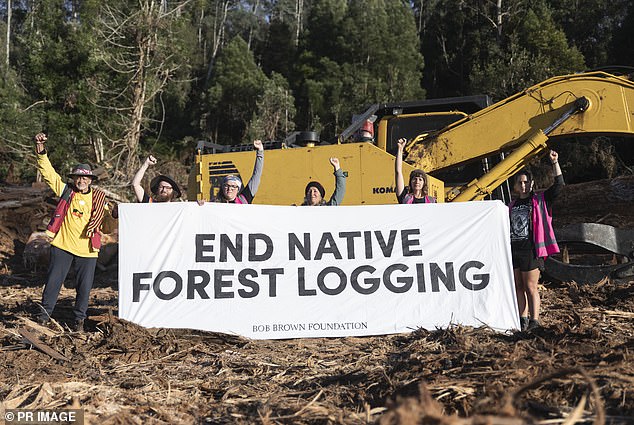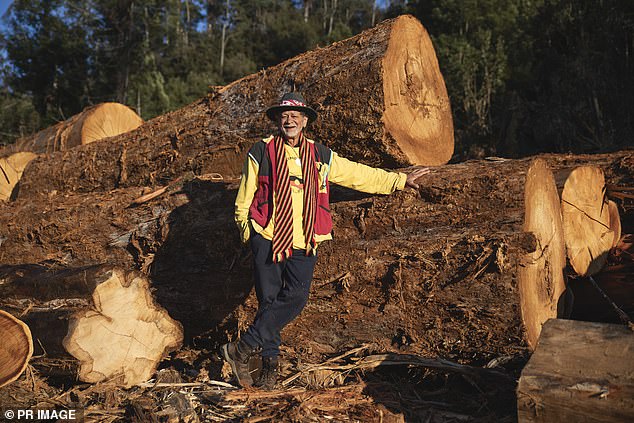A new arrest warrant has been issued for an Aboriginal elder who believes Australian law does not apply to him and has again refused to appear in court.
Jim Everett-Puralia Meenamatta, 81, was due to appear in court on Monday to face charges over anti-logging measures taken by the Bob Brown Foundation in Tasmania.
But Everett said he had no intention of appearing before a “colonial court” and said he “has no jurisdiction over the Aboriginal people who protect our country”.
“We have never made any agreement to become citizens,” he said.
Former federal Greens leader Bob Brown, who heads the environmental action group, defended Everett as “a wise old man”.
“It is underlining the double fact that the First Australians never ceded this country and therefore logging native forests is illegal for them,” he said. The Australian.
Everett was arrested and charged with trespassing in March during a protest against logging in the Giant’s Styx Valley in southern Tasmania.
His case was listed in Hobart Magistrates’ Court in June but he failed to appear, prompting Magistrate Glenn Hay to issue a warrant for the activist’s arrest.
Jim Everett-Puralia Meenamatta (pictured) was due to appear in court on Monday to face charges over the Bob Brown Foundation’s anti-logging efforts in Tasmania.
“There was no need to come forward,” Everett said at the time, adding that he intended to continue his actions.
He also said he was not worried about the prospect of going to prison or receiving a fine.
“Either they’ll get to me before I can do much more… or they won’t,” he said.
I will probably get fined and then I will complete what I am doing and continue to create this problem.
‘There is no point in standing up and arguing with a colonial government and expecting them to listen to you the first time you start protesting about it.
“I’m going to keep pushing.”
Having failed to appear in court again on Monday, Everett faces arrest and possible prison time.
But police first have to find him on the remote Aboriginal island of Cape Barren in Bass Strait, which covers an area of 478 square kilometres and is located 216 kilometres from mainland Tasmania.
As part of his bail conditions, he has been banned from entering Forestry Tasmania’s permanent timber production lands, which make up more than 800,000 hectares of public forest in the state.
But Everett said he had no intention of following through on that.
“I have every sovereign right to go there and protect my country, and they have no jurisdiction to stop me,” he said.
“They will have to carry me by the arms to court.”
He said he would refuse to make a statement before “a colonial court” and instead tell the judge that they were defending their sovereignty.
“They’ll do whatever they want. They could fine me for contempt of court, it could be a whole host of things, it doesn’t matter,” Everett said.
“We will continue to be arrested until this issue is raised nationwide and the government is forced to address the issue of citizenship.”

Everett (pictured left) said he had no intention of appearing before a “colonial court” and claimed it “has no jurisdiction over the Aboriginal people protecting our country”.
Tasmanian Aboriginal Centre campaign director Nala Mansell called for the trespassing charge to be dropped.
“The power that white people have over Aboriginal people, our lives, our culture and our cultural responsibilities has to have some flexibility,” he said in a statement.
‘White people can govern and manage themselves, but their laws should not apply to Aborigines.’
Everett, a Pakana Plangermairreenner man who has written poetry, plays, political and academic articles and short stories, has visited many remote Aboriginal communities.
“If you understand what it means to be Aboriginal, it’s to be part of country,” he said.
“If you harm the country, you harm our community.
‘There has been a lot of research done on generational trauma due to the destruction of our country.’
Daily Mail Australia has contacted Bob Brown for further comment.
(tags to translate)dailymail


